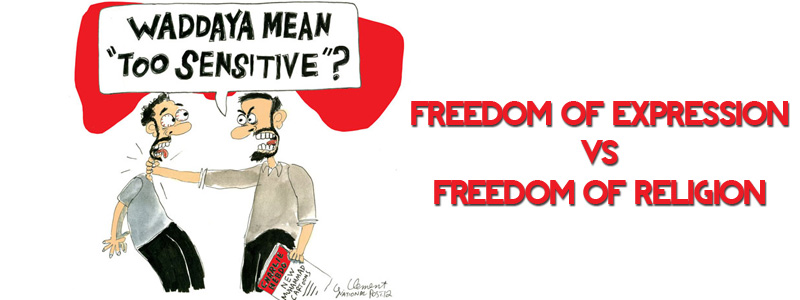Freedom of Expression vs Freedom of Religion
The recent tragedy that occurred at the Charlie Hebdo office in Paris, has again brought in focus the age-old clash between the two fundamental rights of every human being – The Freedom of Expression / Speech and The Freedom of Belief & Religion. It is indeed a condemnable atrocity that was carried out in France in a span of three days, which ended with the lives of 17 people.
The relationship between freedom of expression, freedom of religion & belief and religious intolerance is politically replete and legally complex.
Universal Declaration of Human Rights (UDHR) defines freedom of expression as ‘the right of every individual to hold opinions without interference and to seek, receive and impart information and ideas through any media and regardless of frontiers.’ Further, International Covenant on Civil and Political Rights (ICCPR) states in its Article 19 – ‘Everyone shall have the right to freedom of expression; this right shall include freedom to seek, receive and impart information and ideas of all kinds, regardless of frontiers, either orally, in writing or in print, in the form of art, or through any other media of his choice.’ In addition, Article 18 of IICPR states – ‘Everyone shall have the right to freedom of thought, conscience and religion. This right shall include freedom to have or to adopt a religion or belief of his choice, and freedom, either individually or in community with others and in public or private, to manifest his religion or belief in worship, observance, practice and teaching.’
So, on the face of it, things look pretty straight forward that people should be free to speak and believe as they wish, RIGHT? No. This is where all the political and legal muck starts to coalesce into an incoherent jumble of individual point of views. Add to that the prevailing social, moral and even economic conditions and you get a perfect recipe for brewing a societal friction between two fundamental rights of human beings.
One may ask – How can Free speech be Free if it has restrictions?
Article 20 of the ICCPR lays out – ‘Any advocacy of national, racial or religious hatred that constitutes incitement to discrimination, hostility or violence shall be prohibited by law.’
Freedom of expression as set out in Article 19 of the ICCPR and Article 10 of the European Convention on Human Rights (ECHR) expressly states that the exercise of the right to freedom of expression carries with it special duties and responsibilities. For this reason, specific limitations are permitted, including when necessary for the protection of the fundamental rights of others.
At the point where the freedom of expression is in conflict with an individual’s freedom of religion, we are faced with the dilemma of picking between the two. The exact limitations and privileges of both the rights, are extremely difficult to differentiate and comprehend. While freedom of expression is far from being an absolute right, its limitations are disputable.
Although the freedom of religion is a globally secured human right, there is no worldwide agreement which addresses the substance and degree of the privilege of freedom of religion. Thus it is unverifiable whether it involves the privilege to have one’s religious faith and symbols shielded from insult.
The unsettled limits of debate emerging from the conflict between two key rights have given rise to a never ending debate between freedom of expression and concerns to protect religious sentiments. Religious groups feel insulted that their religious beliefs and symbols are taunted, offended, assaulted or vilified. On the other hand, the creators and authors of these controversial works contend that any law seeking to confine their works adds up to an infringement of the hallowed right of freedom of expression, which is the bedrock of any democratic society.
In this fight between the free speakers and the religious groups, we are confronted with a difficult choice, not just of picking between two good’s but with figuring out which of these is the greater good in a pluralistic society. As the right to speak freely is a condition for democratic government, religious freedom is core to one’s identity and important for one’s sense of equality, dignity and individual autonomy. An antagonistic environment would smother the enjoyment of this right and would repudiate the standards of a genuine democracy.
The task of striking a balance in every individual case is a gigantic one, yet until we begin moving the beach one grain of sand at a time, the tweaking of any judicious and rational guideline won’t be in sight.

